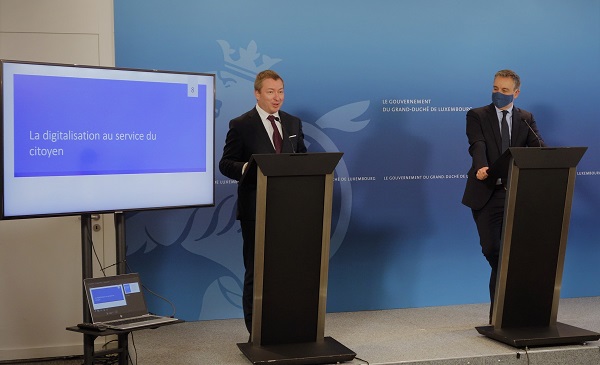 L-R: Claude Meisch, Minister of Higher Education and Research; Marc Hansen, Minister Delegate for Digitalisation;
Credit: MinDigital
L-R: Claude Meisch, Minister of Higher Education and Research; Marc Hansen, Minister Delegate for Digitalisation;
Credit: MinDigital
On Thursday 16 September 2021, Luxembourg's Minister of Higher Education and Research, Claude Meisch, and the Minister Delegate for Digitalisation, Marc Hansen, presented the new fully digital application procedure for student loans granted by the state.
The innovative nature of this approach, the pilot phase of which started on 1 August 2021, lies in the fact that applicants for state financial aid for higher education (Cedies) will be able, after agreement from the responsible ministry, to apply for a loan from their bank electronically in a fully secure and traceable manner. Until now, applicants had been required to go in person to an bank branch - a process which proved particularly restrictive for applicants studying abroad.
“The digitalisation of student loans brings a considerable simplification for the student: saving time [...] and an instant availability of the loan, regardless of the place of study. In addition, this approach offers complete security against fraud”. explained Minister Claude Meisch.
The new fully digital student loan application approach uses innovative Blockchain technology and is the result of the collaboration of the two ministries with a partner in the financial sector, namely the Banque et Caisse d'Epargne de l'Etat (BCEE, or Spuerkeess), playing in this context the role of "pilot bank". Gradually, and at the latest by the start of the academic year 2023-24, this procedure, which constitutes a new step towards the full digitalisation of state financial aid for higher education, will be adopted by all approved banks.
Minister Marc Hansen emphasised the exemplary nature of this collaboration, which is based on new technology. Blockchain facilitates communication between public and private actors concerned who all have access to the same up-to-date information. “This is a flagship public sector Blockchain project that perfectly illustrates how new technology can make life easier for citizens, in this specific case for students. Blockchain technology ensures that coordination between public and private actors takes place in a safe and secure manner”, he noted.
The minister also recalled the EBSILUX project in which the Ministry for Digitalisation participates and which is the result of a European call for projects. EBSILUX aims to develop a solution to provide digital graduate degrees, the authenticity of which can be checked automatically on an interoperable platform.









